Month 8:15, Week 2:7, Year:Day 5945:222 AM
2Exodus 8/40
Gregorian Calendar: Thursday 21 October 2021
Transformation
17a. Relationships & Corporate Metamorphosis

Continued from Part 16
Introduction
Shabbat shalom kol beit Yisra'el and Mishpachah and welcome back to the 17th part of what I hope has been an intruiging time for you all as we have worked our way through the series on Transformation.
The Need for Corporate Transformation
Now that we have seen the possibility of being transformed in spirit, mind, emotions and the physical body, you may be wondering what could possibly be next? And the answer may be had, in part, in the symbolic meaning of the festivals for as you will know the first three are about the personal side of our journey in Christ whereas the last four are all about the corporate side. So the next thing we must experience is the transformation of our relationships as we move out of looking inwards to looking outwards to our brethren and sisters in Messiah.
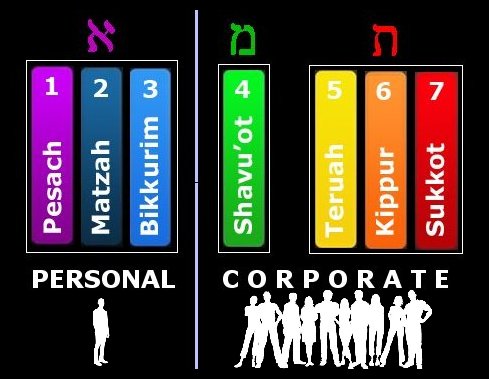 Who the seven annual festivals are directed at
Who the seven annual festivals are directed at
The Demand for a Double Surrender
It has been wisely said that the Christian/Messianic demand is twofold:
- 1. To be unreservedly given to Elohim (God); and
- 2. To be unbreakably given to each other.
When Peter Betrayed His Master...
In other words, a double surrender is called for: (1) to Yahweh-Elohim and (2) to the fellowship of His Messianic Community (Church). And I think this truth is no better illustrated than in the incident that would lead up to the apostle Peter's betrayal of Messiah. Let's take a look at that incident and its background first of all by turning to the 26th chapter of the Gospel of Matthew, beginning at verse 26 with the emphasis on verse 33:
"And as they were eating, Yah'shua (Jesus) took bread, blessed and broke it, and gave it to the talmidim (disciples) and said, 'Take, eat; this is My body.' Then He took the cup, and gave thanks, and gave it to them, saying, 'Drink from it, all of you. For this is My blood of the new covenant, which is shed for many for the remission of sins. But I say to you, I will not drink of this fruit of the vine from now on until that day when I drink it new with you in My Father's kingdom.' And when they had sung a hymn, they went out to the Mount of Olives.
"Then Yah'shua (Jesus) said to them, 'All of you will be made to stumble because of Me this night, for it is written:
'I will strike the Shepherd,
And the sheep of the flock will be scattered.'
"'But after I have been raised, I will go before you to Galilee.' Peter answered and said to Him, 'Even if all are made to stumble because of You, I will never be made to stumble.' Yah'shua (Jesus) said to him, 'Assuredly, I say to you that this night, before the rooster crows, you will deny Me three times.' Peter said to Him, 'Even if I have to die with You, I will not deny You!' And so said all the talmidim (disciples)" (Matt 26:26-35, NKJV).
Peter a Peripheral Believer?
If you read the commentaries discussing the reasons for Peter's downfall and collapse when he denied his Master, you'll find the most common explanation is that 'he followed afar off' or 'at a distance' - in other words, they say he was a 'peripheral' or 'outer ring' believer and that therefore the distance he put between himself and the Saviour was responsible for his disloyalty. I don't agree. I think there was a deeper reason as originally proposed by Dr.E.Stanley Jones (1884-1973), an American Methodist missionary, theologian and author, the 'Billy Graham of India' and regarded by many as one of the greatest missionaries who ever lived. What Stanley Jones believed the truth about Peter is to be found in verse 33 of the passage we just read. So that you may hopefully discern what it is I am driving at here let me share a few samples of other Bible translations:
"Though all men shall be offended because of thee, yet will I never be offended" (KJV, cp.AENT).
"If everyone else deserts You, I won't" (TLB, cp.NRSV).
"But if everyone should lose his faith in You, I never will" (J.B.Philips, cp.JNT/CJB).
"Though they all fall away because of You, I will never fall away" (ESV, cp.NEB).
"Even if the others reject You, I never will" (CEB).
"Even if everyone else trips and falls...I'm never going to do that!" (KNT).
"Even if all stumble in You, I shall never stumble" (ISRV).
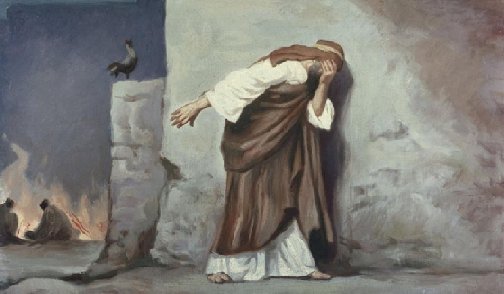 The apostle Peter bitterly repents of his betrayal
The apostle Peter bitterly repents of his betrayal
Breaking With the Corporate Fellowship
Now do you see where I am going with this? The words "all men", "everyone else", "everyone", "they all", "the others" and "all" are the key words here. They're crucial to a proper understanding of what's going on. You see, inwardly Peter had broken with the corporate koinónia or fellowship, and instead of being in a "we" relationship, which is what the festivals of Shavu'ot (Weeks, Ekatost), Yom Teruah (Trumpets), Yom haKippurim (Atonements) and most especially Sukkot (Tabernacles) (which we recently celebrated) are all about, he was in a "they"-"I" relationship! Peter had broken the communal Shavu'ot (Weeks, Ekatost) Covenant and was therefore out of alignment with the spirit of the autumn/fall festivals too! He took a superior, critical, self-righteous and aloof 'I am superior' attitude toward the other talmidim (disciples), of whom he was supposed to be their representative as chief apostle! He broke with the fellowship and automatically broke with Yah'shua (Jesus) in so doing because the Bride of Messiah is plural or many-in-one! Peter, was in effect, declaring that only he (of the apostles) was worthy to be the Bride!
The False Zionist Scenario
Now hear this, and hear it well: many are ready to give themselves to Yahweh for personal inward transformation, but they are not ready to give themselves to the fellowship of Messianic Israel and its Constitution, the New Covenant Torah. In effect, they proclaim the King alright (which is what Evangelical Christianity does for the most part), and though they speak of the 'Kingdom', what they usually mean by that word is something entirely different to the Messianic Kingdom of Torah-obedient nation of Israel. Indeed, the Zionists have proclaimed 'Israel' as something independent of Messiah, a messiah-denying rogue kingdom that Evangelical Zionists hope will, in due course, after they have repented of proclaiming their own false messiah and at the last day will finally join their (that is, the Evangelical) version of a Torahless 'kingdom'.
A King Without a Proper Kingdom
The Enemy has been hard at work on multiple fronts sowing confusion in the matter correctly identifying the King's Kingdom. He has redefined the summer and autumn/fall festivals to mean something entirely different in the orthodox Christian world. Now don't get me wrong - we are not in dispute with Evangelicals and others as to who the King is - on this we are all, hopefully, agreed. The issue lies with misidentifying (and therefore wrongly trying to implement) the Kingdom at least in its outer aspect:
"For behold, the Kingdom of Elohim (God) is within you (in your hearts) (inner) and among you (surrounding you) (outer)" (Lk.17;21, Amp.V).
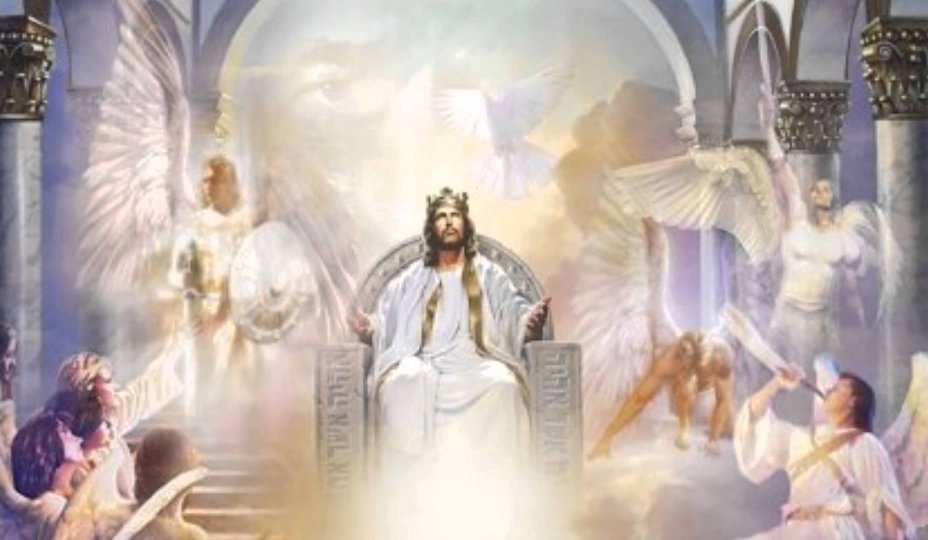 Bible-believing Christians argue not about the King but the Kingdom
Bible-believing Christians argue not about the King but the Kingdom
Wrong Kingdoms Look Like 32,000 Denominations
In other words, it begins within but it moves outwards in an easy-to-recognise form - as a manifestation of the Israelite Nation - not the anti-Messiah modern 'Republic of Israel' or the 'Church' but as 12-tribed Torah-obedient Messianic Israel whose members unanimously recognise and proclaims the true King, Yah'shua (Jesus). Every King has a Kingdom, and every Kingdom has a Constitution and Torot (Laws). So what do a Christian people look like who accept, worship and adore the incarnate King Yah'shua (Jesus) but reject the biblical commandment markers of the Kingdom but substitute in their own version? It looks like 32,000+ denominations. But we'll talk more of that issue later.
The Personal Christian
First, though, let's consider the struggle that so many believers have in taking the next step from the spirit of Yom haBikkurim (Day of Firstfruits), the third of the divine spring moedim or appointments, to the spirit of Shavu'ot (Weeks, Ekatost) and to the heart of the Kingdom. Now it would be untrue to say that nothing of the Kingdom manifests in the soul of a believer upon rebirth as represented by the spring festivals, only that it, first, does not acquire a corporate dimension at that stage, and second, the new believer only selectively implements the body of Kingdom mitzvot (commandments) in his individual life. So it is largely, though not exclusively, personal at this stage. And unfortunately, so many new-born Christians not only unconsciously stay 'solo-Christians' (because they know so little about the Kingdom of Messianic Israel which tends to be replaced by their particular denomination's dominion claims) but they soon come up against unredeemed elements of their flesh nature which protesting, when confronted with joining a congregation, says: 'I can't give myself to these weak, spineless people!' So they stand away, superior, aloof, and only partially transformed. Indeed, this is one of the 'moments of truth' in Christian/Messianic discipleship. A lot of believers abort their spiritual journey at this step.
Transforming Negative Attitudes Toward the Rest of the Body
So this is the challenge: we need to have our attitudes toward the rest of the Messianic Community (Church) utterly transformed for if we deny the fellowship of His Body, we will soon, like Peter, deny Christ...wherever the Body may be spiritually in its development and journey toward truth, whatever errors they may yet be harbouring still, remembering that we too once harboured many errors and may still have a few of our own left to deal with.
An Illustration of the 'We'-'I' Attitude
Let's move onto another passage where we catch another glimpse of this 'We'-'I' attitude:
"So the Ruach (Spirit) lifted me up and took me (Ezekiel) away, and I went in bitterness, in the heat (anger) of my spirit; but the hand of Yahweh was strong upon me. Then I came to the captives at Tel Aviv (Abib), who dwelt by the River Chebar; and I sat where they sat, and remained there astonished among them seven days.
"Now it came to pass at the end of seven days that the word of Yahweh came to me, saying, 'Son of man, I have made you a watchman for the house of Israel; therefore hear a davar (word) from My mouth, and give them warning from Me: When I say to the wicked, 'You shall surely die,' and you give him no warning, nor speak to warn the wicked from his wicked way, to save his life, that same wicked man shall die in his iniquity; but his blood I will require at your hand. Yet, if you warn the wicked, and he does not turn from his wickedness, nor from his wicked way, he shall die in his iniquity; but you have delivered your soul. Again, when a righteous man turns from his righteousness and commits iniquity, and I lay a stumbling block before him, he shall die; because you did not give him warning, he shall die in his sin, and his righteousness which he has done shall not be remembered; but his blood I will require at your hand. Nevertheless if you warn the righteous man that the righteous should not sin, and he does not sin, he shall surely live because he took warning; also you will have delivered your soul'" (Ezek.3:14-21, NKJV).
Ezekiel Learned First to Sympathise and Empathise
When the navi (prophet) Ezekiel went to speak to the captives by the river, the Scripture says he "went in bitterness and anger, but the hand of Yahweh was strong upon me" (Ezek.3:14-15, LB). He was all set to rebuke them for their sins. It was a 'they'-'I' relationship from his side. Then Yahweh invited him to sit where they sat, and Ezekiel said: "I sat among them overwhelmed for seven days" (v.15b, LB). When he "sat where they sat", and learned to sympathise and empathise, the relationship changed from 'they'-'I' to 'we'. Elohim (God) let him speak to them when the seven days were up, and when he spoke he spoke with power - not any old kind of power, but with spiritual power, without self-righteous indignation or disconnected railing accusation.
Yah'shua Sat With Us in 'Flesh' and Empathised
Here, then, is the principle we must all learn if we are to move into the spirit represented by the summer and autumn festivals: no one earns the right to speak for others until he has identified himself with them in a 'we' relationship first, and the central message of Christianity or Messianism, is a 'we' relationship. Without it, there is no Ruach haQodesh (Holy Spirit) present. In Tanakh or Old Testament times, the relationship of Elohim (God) to men was largely a 'they'-'I' one because that is what the people had chosen at Sinai when the Israelites demanded that Moses be their intercessor or 'inbetween man'. Elohim (God) commanded His navi (prophet), and they were expected to obey which him, of course, they didn't, as we all know from their behaviour in the desert. But then Yah'shua (Jesus) came and Elohim (God) literally 'sat' where we 'sit' in flesh like our own, He, the living Torah, identified Himself with us until, at the Cross, the identification became complete, and He took upon Himself our sins when He "became sin for us" (2 Cor.5:21). There the 'I' merged into the 'we' - completely and eternally. Since the centre of the Christian/Messianic faith is a 'we' relationship, then our relationships must be on that basis too: THERE ARE NO SOLO CHRISTIANS IN THE BRIDE OF CHRIST! We relate to others through love shaped by the Torah when it has been supernaturally written on our hearts by the Ruach (Spirit), not by weaponising the Torah by turning it into a cudgel and arrogantly standing apart as superior judges without heart-felt empathy, the way Yahweh does.
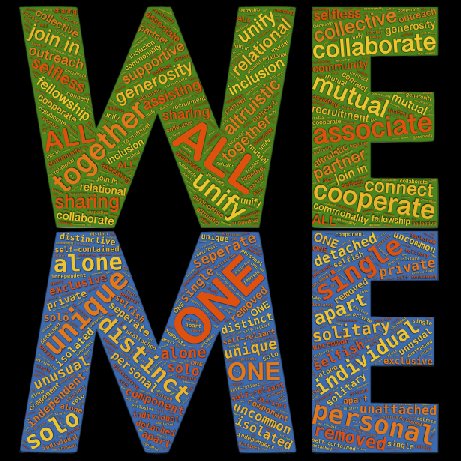
Peter Was Completely Changed at the First Messianic Shavu'ot
We must not leave Peter in his place of disgrace because of his initial 'they'-'I' attitude. Look at him after the first Messianic Shavu'ot or Ekatost (mislabeled 'Pentecost'). Having repented bitterly for his withdrawal and disloyalty, he is now filled with the Ruach haQodesh (Holy Spirit). Notice the change in his language: "...we are all witnesses..." (Ac.3:32, NKJV), and: "...why look so intently at us, as though by our own power or godliness we had made this man walk?" (Acts 3:12, NKJV).
The Disease of the Individual Personality
Trace his statements through the Book of Acts and his two letters and you will discover that, after the first Messianic Shavu'ot (Weeks, Ekatost,'Pentecost'), this man passed from being a sub-Christian/Messianic to entering into a fully Christian/Messianic relationship which is another way of saying 'fellowship'. And that happened supernaturally through self-surrender. Since Yahweh made us for relationships, one of the most eventful things that can happen to us, never to be forgotten, is to experience transformation in this area. I mean, it's pretty important, isn't it?! As one psychologist remarked, "The disease of the world is the disease of the individual personality". If a person tries to live out life on the earth in an exclusively 'they'-'I' attitude then that person will become strange, bizzare, weird...and alone.
The Organist and the Organ-Pumper
Dr.W.E.Sangster (1900-1960), a leading British Methodist preacher who was raised an Anglican like myself, tells the story of a boy who pumped the organ every assembly in a certain church (before organs were electrified). After a special service, the little boy came out from behind the curtain to say to the organist, "We played well today, sir, didn't we?" The organist, in disdain, replied, "Well, I played well." The following week at services, when the organist sat down to play, there was no sound as he depressed the keys. The organist was nonplussed, confounded, flustered, as the minister and the congregation were waiting for him to play the first hymn. Then a voice came from behind the curtain, "Now is it 'we' or is it 'I'?"
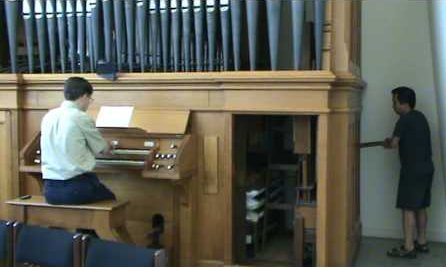 The organist and the organ manual-pumper
The organist and the organ manual-pumper
The Universal Law of Life
You see, the organist did not understand the scripturally-based 'we' relationship as well as the organ-pumper did. Life in the Body of Christ is a cooperative effort and the glory is shared. The law of life established by the Creator, from the tiniest cell upward to tissues, organs and the body as a whole - including spirit, mind and heart - is based on the fact that each entity must lose its life in order to find it again:
"He who finds his life will lose it, and he who loses his life for My sake will find it" (Matt.10:39, NKJV, cp. Mt.16:25; Mk.8:35; Lk.9:24; 17:33; Jn.12:25).
Like Human Stem Cells
Each cell, when it starts out, undifferentiated (a stem cell), is capable of being the whole organism. As it develops, however, it is programmed by the Creator not to be the whole organism, and surrenders, as it were, to the Grand Plan for the whole organism and thus to the whole organism. It differentiates and takes up a particular place (like in the liver or heart), serves the rest, and discovers its exact place or rôle in the fellowship or koinónia of the whole body. It is the law of self-surrender built into the fabric of biology itself at work.
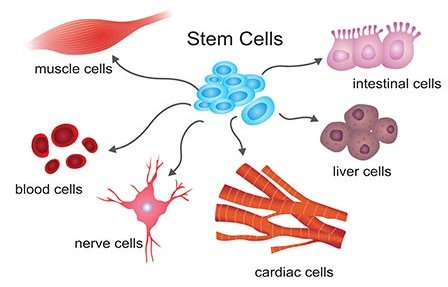
The Built-In Law of Self-Surrender
It's all around us. Look and you will see it is so. When that law is broken then a serious disturbance is created within the organism. One doctor described cancer as "a group of cells turned selfish". They stubbornly refuse to serve the rest of the organism, insist on being independent, and demand that the rest of the organism serves them. The result is a tumour. They attempt to 'save' their lives, and instead lose them - they eat their way to their own destruction. A cell that 'loses' its life for the sake of the others, by finding its place in the body, becomes contributive instead of destructive. A cell that saves its life becomes cancerous. If every member of Christ's Body would say 'we' instead of 'they'-'I' we could have the solution to so many of our problems.
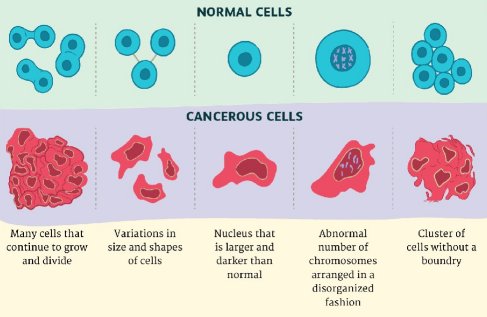
The Curse of Denominationalism
Which brings me to such an important yet hugely difficult matter. One of the biggest hindrances to the 'we' relationship in the Messianic Community (Church) is our denominationalism. Now I don't know the exact figures because they are constantly growing, but in the orthodox Christian community there are, roughly-speaking, over 22,000 independent churches or denominations, 9,000 Protestant denominations, about 1,600 'marginals' so-called, 790 Eastern Orthodox denominations, 240 Catholic denominations and 168 Anglican denominations. As to how many Messianic denominations there are, I do not know as there are no reliable statistics yet.
 So many denominations...
So many denominations...
That They May All Be One
I don't intend to get into a discussion of the denominations themselves as that would take forever-and-a-day. It is deplorable, to say the least, and not at all what Messiah intended. Indeed, what was His prayer for His talmidim (disciples) just before He was arrested, abused and crucified?
"May they all be echad (one). As Thou, Father, art in me, and I in Thee, so they may be in Us - that the world might believe Thou hast sent Me" (Jn.17:21, Moffat).
Love Before Theology
If the world is to believe our testimony then believers of all denominations must, at the very least, present unity in the spirit as represented by the Feast of Pesach or Passover, which is the revelation of sacrificial love that those truly reborn again possess and demonstrate in all their relationships with each other. The world cannot see what we are inside. All they can see is how we behave. They observe how we treat one another and are either attracted or repelled. We can forget what the other six festivals stand for if we haven't got that 'biggie' right. If love is lost between believers, then no matter how theologically brilliant you may be, no matter how correct and right you may be in your doctrine, it will mean absolutely nothing without the presence of this love. And to think otherwise, as so many Christians and Messianics do, is to widely miss the mark and sin. Our witness then becomes worse than useless but a hindrance to those seeking the truth.
The Proper Response to Other Believers and Non-Believers
The demonstration of our discipleship is first and foremost to be seen in the way we love - the way we love Catholics, Calvinists, Charismatics, Messianics - those of any denomination - is the tell-tale sign of what spirit we operate in. It doesn't mean that we have to agree with, or endorse, any false doctrines they may be teaching (Yah forbid) any more than it means we must accept the worldview of atheists whom we are also to love as human beings the way Christ did. This goes for the teachings and practices of Moslems, Hindus, Wiccans too, and especially those who are our sworn our enemies because we are commanded to love the individual people within these and all communities without being required to identify with their religious communities per se. But it is different with fellow believers of different traditions, those genuinely born-again believers who love Christ. If they're not born-again, well, they are dead in their sins and might as well be atheists, and should be loved in that way. How far we embrace various Christian or Messianic communities will depend where they stand relative to the Seven Ruachot (Spirits) of the individual festivals. You have to use your own wisdom and experience in determining how far you will go with them to fulfil your obligation to both love them and at the same time strictly stay within the boundaries of truth.
The First Principle of the Gospel
We're talking about the first principle of the Besorah (Gospel, Good News) here. Miss this and you miss everything else. This was the whole thrust of Paul's great exposition of love in 1 Corinthians 13. So stay with me as we try try to keep this as simple and as focussed as we can because I don't want to address complexities in this series of sermons because I am more interested, as I keep saying, in the 'big picture'.

Defining True Religion
So permit me now, if I may, to try and explain what true religion is from this perspective, without going into detailed definitions for which I am otherwise well-known for doing. So here goes: True religion is a dynamic attitude to Elohim (God), to other people, to the 'universe', and to oneself. Remember, I am speaking very broadly now as we step back to see the big picture. Why do I define true religion thus? The reason is because a personal relationship can never be reduced to a rationalist calculation or a doctrinal set, however much the academics and theologians may wish to do so at times. "Pure religion," said James, "is to visit the fatherless and widows in their affliction, and to keep unspotted from the world" (Jas.1:L27, NKJV). It's immensely practical and hands-on. It isn't reducible to the purely theoretical.
New Dimensions of Otherness or Transcendence
A dynamic relationship, for example a loving relationship, does not merely develop according to predictable premeses, but always produces surprises. A loving relationship does not follow scientific maxims and systems, let alone doctrinal creeds. Now that doesn't mean you can't study loving relationships systematically and scientifically if you absolutely want to. But no science or logic can ever completely understand a loving relationship because the dynamic in a relationship between individuals always reveals new dimensions of 'otherness' - I'll explain what I mean by that in a second. At the same time, the experience of the other person's 'otherness' provides an experience of one's own 'otherness'. A real loving relationship - unlike romantic idealisations - always leads to a change in all of the persons concerned. In religion we call this 'transcendence' or 'otherness'. And by both words I mean something akin to 'beyond experience', a state of being, an existence, if you like, something you can neither think about nor mention because it's beyond words. This transcendence or 'otherness' is a gift from Heaven and from the other person you are in relationship with - it can be received but not produced. The experience of transcendence always reveals new sides of the mystery of life, sides that are not accessible within a purely retionalistic worldview.
Numinosity
There's something very mystical and inexplicable that happens when two individuals love one another and produce a relationship, especially when it is shaped in a spiritual context, irrespective of the religious or denominational traditions they may adhere to. No two people are alike, even in the same denomination, local congregation or even in a marriage. When there is pure sacrificial love - ahavah, chesed, or agapé love, which comes from Christ, even if you may not know His Name or even believe in a God, produces numinosity, something that is awe-inspiring which suggests to the deepest parts of the soul the presence of the divine.
 Right relationship beings numinosity, a sense of awe
Right relationship beings numinosity, a sense of awe
From Innocence to Knowing
At the very basic level, immersion in this kind of life transcends all the 'differences' because what happens here is a relationship that occurs before anyone starts the process of 'differentiating', 'calculating' or 'analysing' the experience. Don't get me wrong, we do have to 'differentiate' at some point so that we can understand the difference between truth and falsehood, light and darkness, because this is how we can 'see' whether the transcendental experience is from Yahweh, the Ultimate Reality, or from counterfeiting spirits who seek to create false 'transcendences' and 'othernesses'. You see, the eyes of divine transcendence in Christ are the eyes of innocence, the kind that small children possess. Yet we have to grow up too and cannot remain in 'Eden' but we do need to have that foundation of innocence divinely and supernaturally established within us first. And that is part of the experience of 'spiritual rebirth' or 'being born again' and of being forgiven for sins. It is a transference out of the carnal universe and into the divine one.
Learning Basic Communal Covenant Love
But we started with denominationalism and we need to face the sad reality of the fractured Body of Christ. The point is this: in spite of all the doctrinal errors, we can still enjoy this transcendent unity with all spiritually regenerated believers on a fundamental level. Such regenerated persons are surrendered to, and trusting in Yah'shua (Jesus) by an act of will, to the best of their understanding, knowing that more light and truth must break through and that more repenting and surrendering must be done. Everyone coming to the fullness passes through this purifying sieve. Only those who are not genuinely born again cannot do this. Those who have a wrong mental attitude towards people, which is itself a sign of a failure to be regenerated by the Ruach haQodesh (Holy Spirit) in one or more areas of being or even the whole being, quickly find themselves relating arrogantly and condescendingly to other believers in a 'they'-'I' type of relationship. Again, please understand, I am not saying the theological differences aren't important but that the initial tranformation into communal, covenant love is what is essential, or we will never be able to spiritually interface with other believers. My point is that the fleshy, unregenerated person has the unfortunate tendency to focus on the differences rather than on that which matters the most, which is divine love. It's where we must all start or fail.
Not Ecumenicism
You understand, I hope, that I am not preaching ecumenicism of the kind promoted by such bodies as the Word Council of Churches (WCC) where doctrine has been so diluted so to find common ground that there's usually nothing left except some sort of a liberal, marxist-leaning (and these days postmodernist, 'woke') social gospel. I am simply reiterating what Yah'shua (Jesus) said about His talmidim (disciples) that "ye shall know them by their fruits" (Matt.7:16, KJV) and what John taught about love:
"We know that we have passed from death to life, because we love our brothers. Anyone who does not love remains in death" (1 John 3:14-15, NIV).
Prayer
All of this I have said to lead you into my final message in this series next week. Let's bring all of this together and pray: "Dear Heavenly Father, thank you for surpassing love that you give to us through faith and self-surrender. Give me the grace not only to trust You, but to also trust my brothers and sisters whom You have brought into Communion with You. Show me that, despite the weakness of this fellowship, that You are its centre. I am overhwlemed as I realise that, in sending Yah'shua (Jesus) to this world, You said 'we' to the utmost limit. Help me to say it, and to live it, with no reservations, for I understand that if Your work is to be accomplished in this world, then we must move and act together. Not You by Yourself, or me by myself - but 'we' together. Help me to obey this mitzvah (commandment) You gave. Your Son, Yah'shua (Jesus), our Master and Deliverer, taught us to say, 'Our Father' but we still say, 'My Father'. We need help. Save us or we will head for trouble. We understand, deep within, that you are calling the Messianic Community - the True Bride and Remnant - to this kind of Unity. It's taking us a long time, Father, so help us all to be the ones to speed it up. In Yah'shua's Name. Amen."
Conclusion
I look forward to seeing you all again next week for the last teaching in this series. May the Master go with you. Amen.
Continued in Part 17b
Acknowledgments
[1] Selwyn Hughes, Every Day With Jesus: The Transformed Life (Crusade for World Revival, Walton-on-Thames, Surrey, UK: 1979)
[2] Johan Lundberg (editor), AXESS Magazine - Society, Science. Culture: From the Return of Religion to the New Narrow-Mindedness (Axel och Margaret Ax:son Johnson Foundation, Stockholm: 2008)


 V306
V306
|


